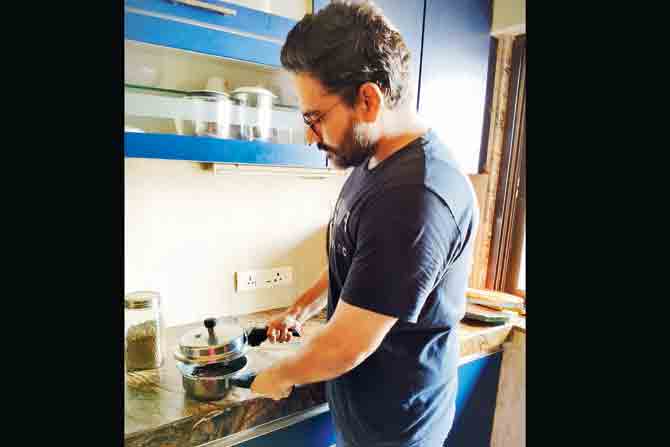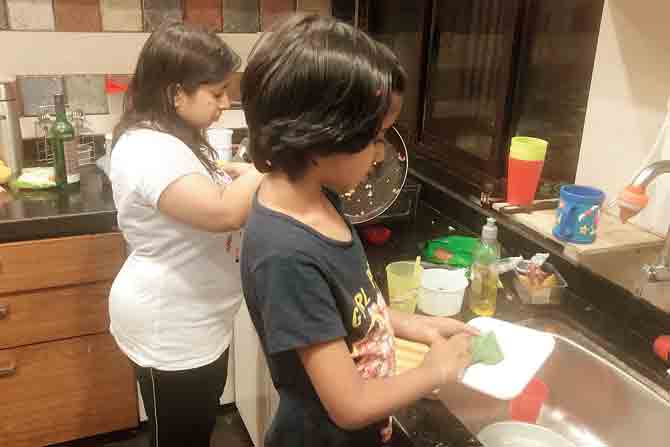Is a home without help, a home at all? Families, who for the first time have had to grapple with the absence of domestic help, tell us why #majormissing is happening

Neha Ashar Sonawane, who lives with her husband and in-laws in Colaba, says that every family member has taken up one task at home, so that all of them get to do what they love, which is to spend time with her two-year-old son
The Joss's flat in Chembur has had two less visitors since the lockdown began: their cook, Jyoti Jadhav, and the house-help, Asha Waghmare. And while absence is said to make the heart grow fonder, the lack of maids, has had this family eat out of their own hands.
Where Jyoti would make piping hot chai and garma garam poha or omelette for breakfast, followed by lunch, and Asha handled the dishes and cleaning, these tasks have now been taken over by Sonya MH, homemaker and mother to two girls, aged six and two. The former banker has had a chock-a-block schedule for the last two months—it's the busiest since marriage, having to manage all the household chores, while looking after the children. That she has help from her husband, Jake Joss, who is working from home, and sister-in-law, Tess, who is living with them, has made the lockdown slightly bearable.
While it is the house-helps that run the show in most homes in Mumbai, social distancing norms have forced many housing societies to ban their entry.
ADVERTISEMENT
This has made the average, over-dependent Mumbaikar, the master as well as maid of their own chamber. But nobody seems to be loving it.

Devansh Jhaveri, CEO, founder and owner of Mafia Chef, a food brand popular for its handcrafted sauces, has been cooking and sweeping since the lockdown
Malabar Hill resident Devansh Jhaveri jokes that he could write a new book, on his journey, From CEO to house-help, in 30 days. Jhaveri is the CEO, founder and owner of Mafia Chef, a food brand popular for its handcrafted sauces. The 38-year-old, who lived in the US till 2009, remembers doing his own laundry and housework, because one had to pay through their nose for the services of a help. But, Mumbai, he says, has spoiled him.
When the help who did the "chutta kaam" and their cook of several years, Akshita More, stopped showing up, members in the Jhaveri household were confident of pulling through. "We thought this was just a matter of days, and everything would be okay soon," says Jhaveri. But when days turned into weeks, and weeks into months, they realised they were staring at a nightmarish future of unwashed clothes, stacks of dirty utensils, and dusty shelves. They had to take a call to action. Devansh and his brother decided to do jhadoo-pocha on alternate days, while their mum took charge of the cooking. On some days, when Devansh feels like rustling up something special, he gives his mother a break. Last week, he made rajma chawal, and before that chole kulche.
The Sonawanes, who live in Colaba, have also been forced to devise a new, workable solution to run the home. Neha Ashar Sonawane, who is a pre-nursery school teacher and a mother of a two-year-old, doesn't remember a day, when there wasn't a maid in their house. "Even in my parent's home, we've always had house-help," says Sonawane, who moved in with her in-laws four years ago. Incidentally, their help had gone on leave to be with her parents in Alibaug, nearly 10 days before the lockdown. By the time, she was to resume, she went incommunicado. "My in-laws and husband are very supportive. We thought that it would be best if we all took up one task at home, to ensure that nobody has too much on their plate, and that everyone gets time with my son." While her mother-in-law does the cooking, Neha sweeps the floor and divides the washing of utensils and clothes, with her husband. Her father-in-law mops the floor. Once in two or three weeks they order in, to
ease the mother-in-law of the cooking. "This is the only way we've been able to maintain our sanity. Household tasks can take up the entire day, and leave you exhausted by the end."
Sonya, for instance, has little time with the kids, these days. "When the helps were around, I could steal a few hours with my daughters in the afternoon. We'd go to the garden in our complex, or sometimes, I'd help my elder daughter Alithea with her homework. Now, the only time we get is when we are at the dining table during lunch or dinner," she says.
What Sonya also misses is making small talk with her help. "Jyoti has a child, who is my youngest daughter's age. So, we discuss our kids a lot. She was good company."
In her 2017 non-fiction, Maid in India: Stories of Inequality and Opportunity Inside Our Homes (Aleph Book Company), journalist Tripti Lahiri offered an eye-opening account of the complex and troubling relations between the help and those they serve. For much of India's independence, wrote Lahiri, only a very tiny share of people could afford to have servants. "But in the last two decades, Indians who are experiencing, at long last, a new level of prosperity are increasingly able to hire people to aid in carrying out the astonishing amount of housework that life in India seems to entail at any income level.
In the decade after liberalisation in 1991, the number of maids, drivers and nannies in India doubled. Their ranks doubled again in the decade that followed.
Particularly for the growing numbers of women who work in urban India, work-life balance, depends increasingly on having help," says Lahiri in the book.

Homemaker Sonya MH says her six-year-old daughter Alithea has been helping her with the dishes and cleaning
The fact that a whole industry—placement agents—cropped up around domestic help in the last few decades points to the fact that there was more money to be made from it because of increased demand, even if it's hard to see that pattern in statistics, says Lahiri, in an email interview.
Writer Payal Kapadia's 2018 novel Maidless in Mumbai (Bloomsbury Books) is the story of Anu Narain, a career-driven reporter thrown into motherhood and who wants the perfect maid to live happily forever after with. Kapadia says that one can't ignore the role of the house-help in emancipating the urban Indian woman. "The pre-occupation of having a maid, or not having one is always a female one. In my book, the maid becomes a panacea for all the struggles the protagonist endures to return to work. I was poking fun at this employee-employer relationship, which is unlike any other, because the memsahib is so terrified of losing her maid.
There is just so much more of a demand for maids, than there is a supply."
Kapadia feels that we are on the cusp of change, "where we are looking at experiencing what Western societies did over a century ago, when the whole idea of Downton Abbey—the below the stairs and above the stairs culture—changed, and people just had to automate and simplify their lives, because there weren't enough house-help anymore." "I wondered what that would mean for liberated, modern women, and how they would develop strategies to pressure the other people in their lives to pull their weight," she says.

Payal Kapadia, author
The pandemic, she says, has brought these issues to the fore. "It has forced us to look at things that we haven't looked at closely before, whether it's so much more time with our families, or the small behind-the-scenes jobs that get done without our noticing.
Interestingly enough, now that the men and children are home, this invisible labour [that women and the house-help provide] is becoming more visible. Our husbands and kids are beginning to realise that there is no house fairy doing the job, and it has forced all of us to take stock. It's a sobering message."
Jhaveri agrees. "After doing this for two months at a stretch, I've realised how much we took our helps for granted. We tend to over-rely on them, and yet it pinches everyone, when it comes to paying them, for not working during the lockdown. If anything, I hope we all learn to respect what they do."
Lahiri, however, isn't so sure. "I don't think the lockdown will change anything. Except that having done all their own cleaning for the last two months, and spotted all the nooks and crannies that were being neglected, employers will give helpers an earful when they return to work. And perhaps instead of going back to the gym, some urban people will stick with their new jhadoo-pocha workout regimes."
Catch up on all the latest Mumbai news, crime news, current affairs, and a complete guide from food to things to do and events across Mumbai. Also download the new mid-day Android and iOS apps to get latest updates.
Mid-Day is now on Telegram. Click here to join our channel (@middayinfomedialtd) and stay updated with the latest news
 Subscribe today by clicking the link and stay updated with the latest news!" Click here!
Subscribe today by clicking the link and stay updated with the latest news!" Click here!







